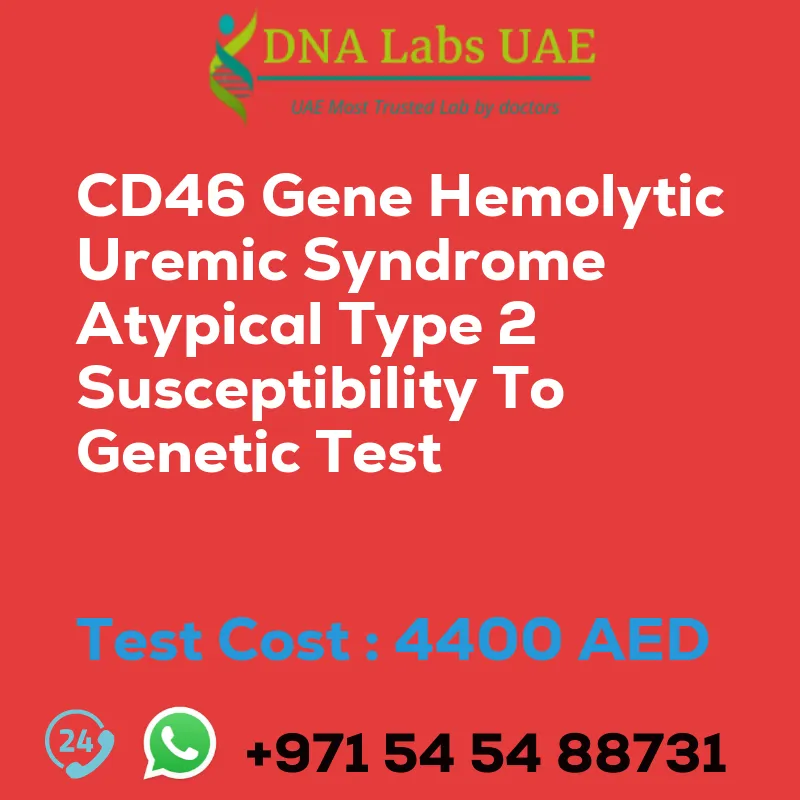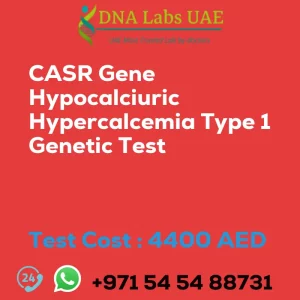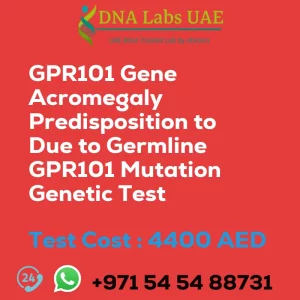CD46 Gene Hemolytic Uremic Syndrome Atypical Type 2 Susceptibility to Genetic Test
Test Name: CD46 Gene Hemolytic Uremic Syndrome Atypical Type 2 Susceptibility to Genetic Test
Components:
- Price: 4400.0 AED
- Sample Condition: Blood or Extracted DNA or One drop Blood on FTA Card
- Report Delivery: 3 to 4 Weeks
- Method: NGS Technology
- Test Type: Hepatology Nephrology Endocrinology Disorders
- Doctor: General Physician
- Test Department: Genetics
Pre Test Information:
Clinical History of Patient who is going for CD46 Gene Hemolytic Uremic Syndrome, Atypical Type 2, Susceptibility to NGS Genetic DNA Test. A Genetic Counselling session to draw a pedigree chart of family members affected with CD46 Gene Hemolytic Uremic Syndrome, Atypical Type 2, Susceptibility to NGS Genetic DNA Test gene CD46.
Test Details:
CD46 gene hemolytic uremic syndrome, atypical type 2 is a genetic disorder characterized by abnormal activation of the complement system, leading to the destruction of red blood cells, low platelet count, and kidney damage. It is an atypical form of hemolytic uremic syndrome (HUS) that is caused by mutations in the CD46 gene. The CD46 gene provides instructions for producing a protein called membrane cofactor protein (MCP). MCP helps regulate the complement system, which is part of the immune system that helps destroy foreign invaders. Mutations in the CD46 gene can disrupt the function of MCP, leading to uncontrolled activation of the complement system.
NGS (Next-Generation Sequencing) genetic testing is a type of genetic testing that allows for the simultaneous analysis of multiple genes. It uses advanced sequencing technologies to rapidly sequence the DNA and identify mutations or variations in specific genes, including the CD46 gene. NGS testing can help identify the specific genetic changes responsible for hemolytic uremic syndrome and provide information about the individual’s susceptibility to the disorder.
By identifying the genetic mutations associated with CD46 gene hemolytic uremic syndrome, atypical type 2, NGS testing can help with diagnosis, prognosis, and treatment decisions. It can also be used for genetic counseling and family planning purposes, as it can determine the likelihood of passing on the condition to future generations.
| Test Name | CD46 Gene Hemolytic uremic syndrome atypical type 2 susceptibility to Genetic Test |
|---|---|
| Components | |
| Price | 4400.0 AED |
| Sample Condition | Blood or Extracted DNA or One drop Blood on FTA Card |
| Report Delivery | 3 to 4 Weeks |
| Method | NGS Technology |
| Test type | Hepatology Nephrology Endocrinology Disorders |
| Doctor | General Physician |
| Test Department: | Genetics |
| Pre Test Information | Clinical History of Patient who is going for CD46 Gene Hemolytic uremic syndrome, atypical type 2, susceptibility to NGS Genetic DNA Test. A Genetic Counselling session to draw a pedigree chart of family members affected with CD46 Gene Hemolytic uremic syndrome, atypical type 2, susceptibility to NGS Genetic DNA Test gene CD46 |
| Test Details |
CD46 gene hemolytic uremic syndrome, atypical type 2 is a genetic disorder characterized by abnormal activation of the complement system, leading to the destruction of red blood cells, low platelet count, and kidney damage. It is an atypical form of hemolytic uremic syndrome (HUS) that is caused by mutations in the CD46 gene. The CD46 gene provides instructions for producing a protein called membrane cofactor protein (MCP). MCP helps regulate the complement system, which is part of the immune system that helps destroy foreign invaders. Mutations in the CD46 gene can disrupt the function of MCP, leading to uncontrolled activation of the complement system. NGS (Next-Generation Sequencing) genetic testing is a type of genetic testing that allows for the simultaneous analysis of multiple genes. It uses advanced sequencing technologies to rapidly sequence the DNA and identify mutations or variations in specific genes, including the CD46 gene. NGS testing can help identify the specific genetic changes responsible for hemolytic uremic syndrome and provide information about the individual’s susceptibility to the disorder. By identifying the genetic mutations associated with CD46 gene hemolytic uremic syndrome, atypical type 2, NGS testing can help with diagnosis, prognosis, and treatment decisions. It can also be used for genetic counseling and family planning purposes, as it can determine the likelihood of passing on the condition to future generations. |








